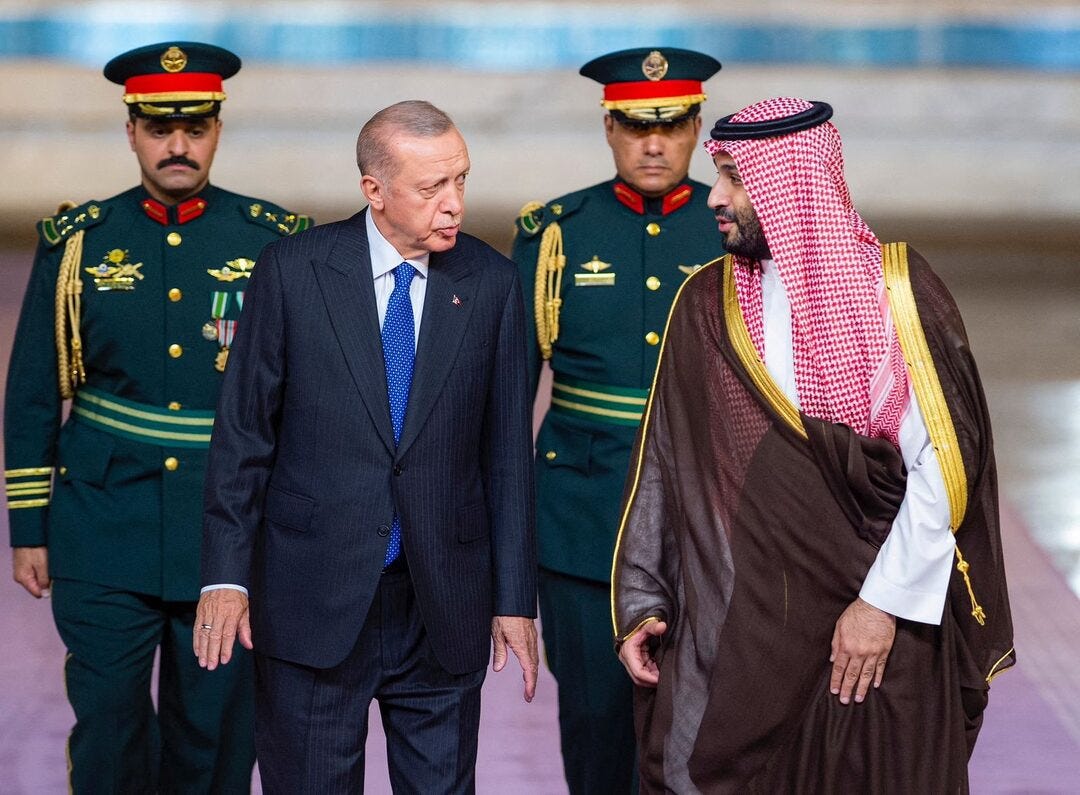Bracing Escalation: Turkey-Saudi $6 Billion Defence Deal
The deal advances both Saudi and Turkey's regional ambitions and strengthens their ties in the face of Iran's attempts to forge new economic partnerships in the region.
This March, Turkish President Recep Tayyip Erdoğan is expected to finalise a $6 billion defence deal between Turkey and Saudi Arabia, according to a Bloomberg report citing Turkish officials. The deal will reportedly see Saudi Arabia purchasing arms and participating in Turkey’s Kaan fighter jet programme. Beyond diversifying Saudi Arabia’s defence partnerships, the deal further strengthens Turkey’s role in the Gulf’s India-Middle East-Europe Economic Corridor (IMEC) vision and signals the risk of a broader regional conflict. As tensions rise, Turkey’s growing military capabilities and closer ties with the Gulf position it as a key player in shaping the future of Middle Eastern security and energy markets. The deal comes after EU countries snubbed several Saudi offers to collaborate on their fighter jet programmes.
Turkey’s Defence Industry Shaping the Region
Over the past two decades, Turkey’s defence industry has advanced significantly, with its involvement in regional conflicts such as Syria, Libya, and Nagorno-Karabakh showcasing the capabilities of Turkish-made weapons. Turkish President Erdoğan has long leveraged these regional engagements to maintain domestic support, especially during periods of unpopularity. This growing military capability positions Turkey as an increasingly attractive defence partner for countries in the Gulf Cooperation Council (GCC), both as an alternative and in complement to the United States, with Erdoğan noting that one of Turkey’s key weapons exports, armed drones, is also being purchased by Western countries. According to data from the Stockholm International Peace Research Institute (SIPRI), Saudi Arabia is the world’s second-largest weapons importer, while Turkey ranks as the eleventh-largest exporter. As Turkey’s relations with the GCC strengthen, this potential deal would further solidify its role as a key player in the region’s defence landscape. Last week’s establishment of a KAAN fighter jet joint factory between Turkey and Pakistan is a prime example of this regional trend. Kaan, which has partnered with British defence company BAE Systems to produce these advanced jets, is expected to secure funding from Saudi Arabia through the potential agreement in March.
A Win for Abraham Market Ambitions
The $6 billion deal allows Saudi Arabia to diversify its defence partnerships, potentially reducing its reliance on the United States, as its long-sought Strategic Defence Partner status has yet to be realised. However, this move still benefits the U.S. and Israel, as a more integrated Turkey-GCC relationship strengthens the normalisation bloc, paving the way for the development of the India-Middle East-Europe Economic Corridor (IMEC) trade route.
Although not an official member of the Abraham Accords, Turkey has maintained strong economic relations with Israel, which have not only endured Israel’s war in Gaza, but have actually strengthened; Turkish ships have been seen providing Israel with gas, highlighting the ongoing economic ties between the two countries. Israel and Turkey have long shared mutual interests in energy cooperation, particularly in exploring offshore natural gas reserves. Just a month before Hamas’ 7 October operation, Erdoğan had announced that Turkey and Israel were set to begin drilling soon. Similarly, Ankara promptly revived its 2009 Turkey-Qatar gas pipeline project after the ousting of former Syrian President Bashar Assad, as the pipeline would run through Syria. This partnership places Turkey in a favourable position as it looks to embed itself in the normalising Abraham Accords market of the Gulf: an upcoming defence deal with Saudi Arabia could be a key step towards Ankara’s ambition of becoming a central energy hub, potentially facilitating the transport of Eastern Mediterranean gas to Europe. That said, Turkey’s Syria pipeline efforts could undermine Israel's energy ambitions, possibly explaining its increasing encroachment on Syria and the construction of a military base in the Golan Heights to secure its own strategic and energy interests.
The impending $6 billion defence deal between Turkey and Saudi Arabia marks a significant step in Turkey's growing influence within the Gulf and the broader region. By diversifying defence partnerships and strengthening ties with the Gulf Cooperation Council, Turkey not only solidifies its position as a key player in regional security but also enhances its ambitions as an energy hub. As regional tensions rise, particularly in the aftermath of Israel’s war on Gaza and Lebanon, as well as the ongoing Russia-Ukraine war, the likelihood of a broader regional conflict increases. In such an event, Turkey’s geographical proximity makes it an even more attractive defence partner for GCC members. This deal reflects the shifting power dynamics in the Middle East, with Turkey playing a pivotal role in both defence and energy sectors, further embedding itself into the strategic framework of the IMEC.



